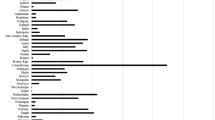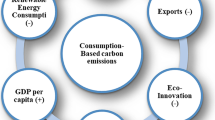Abstract
The primary objective of this study is to explore the links between fossil fuel energy consumption, industrial value-added, and carbon emissions in G20 countries over the period 1990–2020. Panel unit root test, co-integration test, and CS-ARDL estimator were used to determine the relationship among variables. The empirical results suggest that the driving force of carbon emissions in G20 countries varies significantly in advanced versus emerging economies. Evidence in a whole sample of G20 countries and advanced economies supports environmental Kuznets curve (EKC) hypothesis, while no evidence emerging economies supports EKC hypothesis. Apart from this, the empirical results show trade opens, FDI, government expenditures on health and education, research and development, and information and communication technology are other determinators of carbon emissions in G20 countries. Our results suggest that countries upgrade industrial structures by shifting their energy structures away from fossil fuels toward renewable energy sources in order to achieve sustainable environmental goals.
Similar content being viewed by others
References
Ajide KB, Mesagan EP (2022) Heterogeneous analysis of pollution abatement via renewable and non-renewable energy: lessons from investment in G20 nations. Environmental Science and Pollution Research:1-14
Ansari MA, Haider S, Khan N (2020) Does trade openness affects global carbon dioxide emissions: evidence from the top CO2 emitters. Management of Environmental Quality: An International Journal, 31(1):32–53
Apergis N, Ozturk I (2015) Testing environmental Kuznets curve hypothesis in Asian countries. Ecological indicators 52:16–22
Aydin M (2019) The effect of biomass energy consumption on economic growth in BRICS countries: a country-specific panel data analysis. Renewable energy 138:620–627
Azam M, Khan AQ (2016) Testing the Environmental Kuznets Curve hypothesis: a comparative empirical study for low, lower middle, upper middle and high income countries. Renewable and sustainable energy reviews 63:556–567
Balint T, Lamperti F, Mandel A, Napoletano M, Roventini A, Sapio A (2017) Complexity and the economics of climate change: a survey and a look forward. Ecological Economics 138:252–265
Behera J, Mishra AK (2020) Renewable and non-renewable energy consumption and economic growth in G7 countries: evidence from panel autoregressive distributed lag (P-ARDL) model. International Economics and Economic Policy 17(1):241–258
Huang Y, Xue L, Khan Z (2021a) What abates Carbon Emissions in China: Examining the Impact of Renewable Energy and Green Investment. Sustainable Development (2):1–12. https://doi.org/10.1002/sd.2177
Huang Y, Kuldasheva Z, Salahodjaev R (2021b) Renewable energy and CO2 emissions: empirical evidence from major energy-consuming countries. Energies 14(22):7504. https://doi.org/10.3390/en14227504
Huang Y, Haseeb M, Muhammad Usman M, Ozturk I (2022a) Dynamic association between ICT, renewable energy, economic complexity and ecological footprint: Is there any difference between E-7 (developing) and G-7 (developed) countries?. Technol Soc 68:101853. https://doi.org/10.1016/j.techsoc.2021.101853
Huang Y, Maaz Ahmad, Sher Ali (2022b) The impact of trade, environmental degradation and governance on renewable energy consumption: Evidence from selected ASEAN countries. Renewable energy 197:1144-1150. https://doi.org/10.1016/j.renene.2022.07.042
Huang Y, Maaz Ahmad, Sher Ali, Dervis Kirikkaleli (2022c) Does eco-innovation promote cleaner energy? Analyzing the role of energy price and human capital. Energy 239(Part D):122268. https://doi.org/10.1016/j.energy.2021.122268
IEA (2020) World Energy Outlook Retrieved from https://www.iea.org/reports/world-energy-outlook-2020
Im KS, Pesaran MH, Shin Y (2003) Testing for unit roots in heterogeneous panels. Journal of econometrics 115(1):53–74
Mardani A, Streimikiene D, Nilashi M, Arias Aranda D, Loganathan N, Jusoh A (2018) Energy consumption, economic growth, and CO2 emissions in G20 countries: application of adaptive neuro-fuzzy inference system. Energies 11(10):2771
Munir Q, Lean HH, Smyth R (2020) CO2 emissions, energy consumption and economic growth in the ASEAN-5 countries: a cross-sectional dependence approach. Energy Economics 85:104571
Nathaniel SP, Murshed M, Bassim M (2021) The nexus between economic growth, energy use, international trade and ecological footprints: the role of environmental regulations in N11 countries. Energy Ecol Environ 1–17
NASA (2020) Global Climate Change: Retrieved from NASA Global Climate Change Web site: https://climate.nasa.gov/
Ozturk I, Acaravci A (2016) Energy consumption, CO2 emissions, economic growth, and foreign trade relationship in Cyprus and Malta. Energy Sources, Part B: Economics, Planning, and Policy 11(4):321–327
Pesaran MH, Shin Y, Smith RP (1999) Pooled mean group estimation of dynamic heterogeneous panels. Journal of the American statistical Association 94(446):621–634
Pesaran MH (2004) General diagnostic tests for cross-sectional dependence in panels. CESifo Working Paper Series No. 1229; IZA Discussion Paper No. 1240. Available at https://ssrn.com/abstract=572504 60:13-50
Pesaran MH, Ullah A, Yamagata T (2008) A bias-adjusted LM test of error cross-section independence. The Econometrics Journal 11(1):105–127
Shahbaz M, Nasreen S, Ahmed K, Hammoudeh S (2017) Trade openness–carbon emissions nexus: the importance of turning points of trade openness for country panels. Energy Economics 61:221–232
Shahbaz M, Gozgor G, Adom PK, Hammoudeh S (2019) The technical decomposition of carbon emissions and the concerns about FDI and trade openness effects in the United States. International Economics 159:56–73
Tufail M, Song L, Umut A, Ismailova N, Kuldasheva Z (2022) Does financial inclusion promote a green economic system? Evaluating the role of energy efficiency. Economic Research-Ekonomska Istraživanja. https://doi.org/10.1080/1331677X.2022.2053363
Usman M, Jahanger A, Makhdum MSA, Balsalobre-Lorente D, Bashir A (2021a) How do financial development, energy consumption, natural resources, and globalization affect Arctic countries' economic growth and environmental quality? An advanced panel data simulation. Energy:122515
Usman M, Khalid K, Mehdi MA (2021b) What determines environmental deficit in Asia? Embossing the role of renewable and non-renewable energy utilization. Renewable energy 168:1165–1176
Westerlund J (2007) Testing for error correction in panel data. Oxford Bulletin of Economics and statistics 69(6):709–748
Wu H, Xu L, Ren S, Hao Y, Yan G (2020) How do energy consumption and environmental regulation affect carbon emissions in China? New evidence from a dynamic threshold panel model. Resources Policy 67:101678
Yang B, Jahanger A, Usman M, Khan MA (2021) The dynamic linkage between globalization, financial development, energy utilization, and environmental sustainability in GCC countries. Environmental Science and Pollution Research 28(13):16568–16588
Yao C, Feng K, Hubacek K (2015) Driving forces of CO2 emissions in the G20 countries: an index decomposition analysis from 1971 to 2010. Ecological informatics 26:93–100
Zeng C, Stringer LC, Lv T (2021) The spatial spillover effect of fossil fuel energy trade on CO2 emissions. Energy 223:120038
Availability of data and materials
The dataset used during the current study are available from corresponding author on reasonable request.
Funding
This work is supported by the Chinese National Funding of Social Sciences (No. 21BJL008).
Author information
Authors and Affiliations
Contributions
Yongming Huang: Conceptualization, Policy recommendation, Revision, Supervision. Zebo Kuldasheva: Data collection and analysis. Shakhrukh Bobojanov: Methodology, Data collection. Bekhzod Djalilov: Introduction, Literature review. Raufhon Salahodjaev: Introduction, Literature review. Shah Abbas: Interpretation. All the authors read and approve the final manuscript. ORCID: Yongming Huang https://orcid.org/0000-0003-0033-9277
Corresponding author
Ethics declarations
Ethical approval
This study follows all ethical practices during writing. We confirmed that this manuscript has not been published elsewhere and is not under consideration in any journal. Ethical approval and consent do not applicable for this study.
Consent to participate
Not applicable
Consent for publication
Not applicable.
Competing interest
The authors declare no competing interest.
Additional information
Responsible Editor: Roula Inglesi-Lotz
Publisher’s note
Springer Nature remains neutral with regard to jurisdictional claims in published maps and institutional affiliations.
Rights and permissions
Springer Nature or its licensor holds exclusive rights to this article under a publishing agreement with the author(s) or other rightsholder(s); author self-archiving of the accepted manuscript version of this article is solely governed by the terms of such publishing agreement and applicable law.
About this article
Cite this article
Huang, Y., Kuldasheva, Z., Bobojanov, S. et al. Exploring the links between fossil fuel energy consumption, industrial value-added, and carbon emissions in G20 countries. Environ Sci Pollut Res 30, 10854–10866 (2023). https://doi.org/10.1007/s11356-022-22605-9
Received:
Accepted:
Published:
Issue Date:
DOI: https://doi.org/10.1007/s11356-022-22605-9




